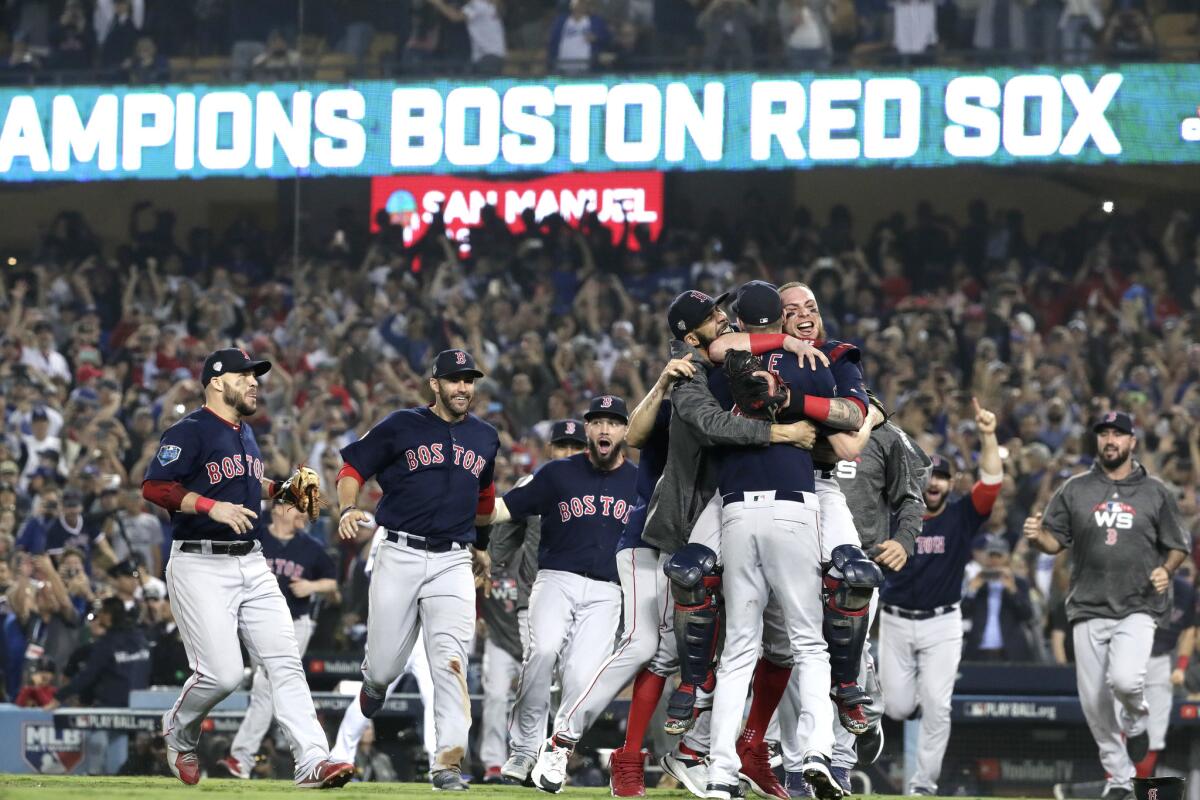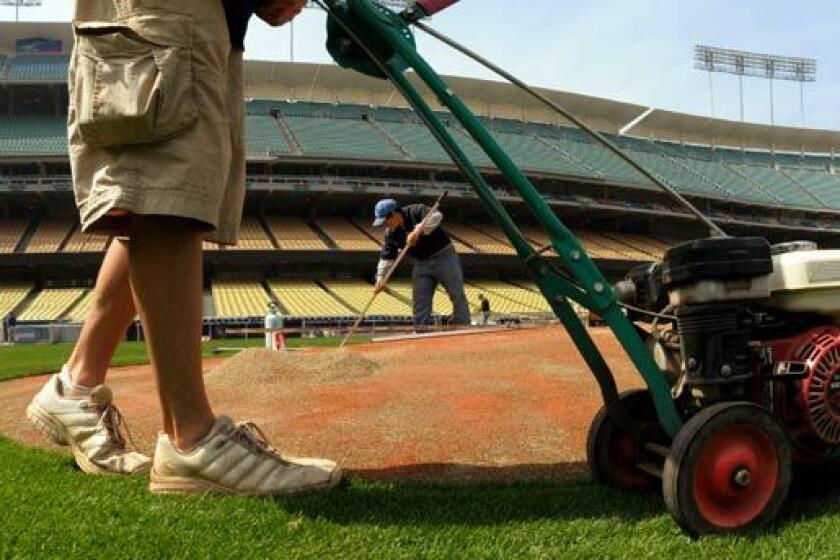Red Sox investigation does little to solve video problem

- Share via
Close the video room the way the Dodgers do their cash registers when they’re asked to refund tickets. Lock up the iPads and mobile phones.
Don’t just restrict the use of electronic devices during games. Eliminate it entirely. Anything less would be inviting more trouble for Major League Baseball.
That’s about the only conclusion that could be drawn from Commissioner Rob Manfred’s generally inconclusive report on his office’s investigation into the Boston Red Sox’s improper use of a video replay system during the 2018 season that ended with a victory over the Dodgers in the World Series.
More than anything, the 15-page report released Wednesday was evidence of how policing the illegal use of electronic equipment borders on impossible. Current and former Red Sox players had no incentive to reveal the truth, a reality the commissioner’s office tacitly acknowledged when it offered them immunity and anonymity in exchange for their testimonies.
As expected, the findings were unspectacular. Manfred concluded that a Red Sox advance scout who doubled as a replay room operator “on at least some occasions” used in-game video feeds to decode other teams’ signs. The Red Sox didn’t know what type of pitch was about to be thrown on a pitch-by-pitch basis. Instead, they used the information provided by the replay room operator to relay signs from second base to the batter’s box.
MLB found the Red Sox illegally used technology to steal signs during the 2018 season, but only one Red Sox employee, an advance scout, was suspended.
The evidence was “insufficient” to conclude the illegal practice extended to the World Series, in which the Red Sox trounced the Dodgers, four games to one.
The Red Sox were penalized far less severely than the trash can-thumping Houston Astros, as they were docked only a second-round selection in the upcoming draft. J.T. Watkins, the replay room operator, was the only individual disciplined. Watkins was suspended without pay for the 2020 season and prohibited from working in a replay room in 2021.
By characterizing the Red Sox’s scheme as essentially a one-man operation conducted by Watkins, the report pushed the boundaries of credibility. Take the assertion of how there was no evidence that Red Sox manager Alex Cora or any member of his staff “knew or should have known” what Watkins was doing. In a separate report released three months earlier, Cora was described as one of the masterminds of the Astros’ scheme. Cora will be suspended for the 2020 season, but for what he did as the Astros bench coach, not as the Red Sox manager.
Maybe Cora didn’t know what Watkins was doing. Unfortunately for him, the court of public opinion doesn’t function like the court of law. The absence of evidence isn’t necessarily accepted as proof of innocence. In cases like this, it’s viewed more as a reflection of the governing body’s limited power. Rather than believe Cora was reformed, people are more likely to think investigators simply weren’t able to convince anyone to reveal his involvement.
Similarly, whatever reasons Manfred offered for believing the Red Sox defeated the Dodgers on a level playing field — he pointed to how his office placed full-time in-person monitors in replay rooms for the playoffs that year — questions will remain about the 2018 World Series. How could there not?
The Dodgers were taken down by a team that batted .353 in the series with runners in scoring position, including .471 with two outs.
The Red Sox are in a position where they have to defend themselves against allegations that can’t be completely disproven. That’s not the problem. They created this mess and they have to deal with the consequences. The problem is how these suspicions compromise the integrity of the entire sport.
As long as there are monitors in the clubhouse, this won’t be the last of it. There will always be whispers about how certain teams are gaming the system, gradually eroding the public’s trust of the fairness of the competition. Every allegation will move baseball a step closer to professional wrestling.
Manfred’s report indirectly raised another issue, which is that some Red Sox players who suspected Watkins was using the replay to decode signs didn’t realize that he might be in violation of league rules.
Ignorance of the law doesn’t count as a reasonable excuse when boundaries are overstepped. Manfred clearly viewed the Red Sox as a team operating in a gray area, as compared to the Astros, who were obviously cheating. If anything, Manfred praised the Red Sox front office for consistently communicating sign-stealing regulations to non-player staff and making “commendable efforts toward instilling a culture of compliance in their organization,” even though these messages never reached the players.
Gameday workers impacted during the COVID-19 pandemic will collectively receive $1.3 million in financial assistance from the Dodgers.
These gray areas are disconcerting. A champion should be a champion, period. No sport should want the legitimacy of its championships to be retroactively litigated as they are now.
Manfred said in spring training that he believed the use of video had to be restricted and the league was close to implementing a new set of regulations before the sport was shut down by the coronavirus outbreak, according to a person familiar with the situation who spoke under the condition of anonymity.
Instead of simply restricting the use of technology, the league should look to eliminate it entirely. No more gray areas. No more places from which hard-to-prove allegations could emerge. Make it clear cut: If a team has an in-game feed in its clubhouse, it’s in violation, no ifs, ands or buts.
If baseball’s replay system has to be abandoned to make that happen, so be it. When the league presented teams with opportunities to challenge potentially botched calls, it did so with the intention of improving its credibility. At this point, maintaining the system might be doing more harm than good on that front.
More to Read
Go beyond the scoreboard
Get the latest on L.A.'s teams in the daily Sports Report newsletter.
You may occasionally receive promotional content from the Los Angeles Times.













